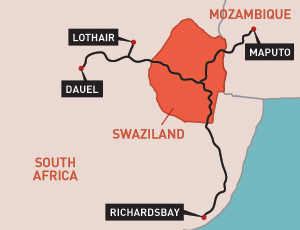
Transnet SOC Ltd., the state-owned port and rail-freight operator of South Africa, and Swaziland Railway have inked a deal for the construction of a 146-kilometer rail line that will create additional capacity for transporting coal exports from the region.
The new $2-billion rail line will link South Africa’s coal-producing province of Mpumalanga at Lothair to Richards Bay, one of the largest world’s coal export terminals, through the landlocked Swaziland, Africa’s last absolute monarchy.
“When complete, this new line will create additional capacity of 15 million tonnes, which will predominantly be general freight volumes from the existing coal export line,” said Transnet CEO Brian Molefe after signing the deal in January.
“The first train will run in three years’ time,” he added. The deal paves the way for preconstruction work, including land acquisition, surveying, project costing and environmental impact assessments.
Actual construction, according to Transnet, will begin in 2014, while the upgrading of rail lines connecting the new link to ports in South Africa and Mozambique will start early in 2013.
The new line, geared right now for diesel engines, will feature crossing loops after every 40 km and will be built so that it can be upgraded for electric trains.
Transnet is acquiring General Electric locomotives for the line. The rising demand for more coal, especially in India and China, along with South Africa’s desire to satisfy this growing market, has informed the decision to expand infrastructure to accommodate the anticipated rise in coal export volumes in sub-Saharan Africa’s largest economy.
The Richards Bay terminal, operated by Richards Bay Coal Terminal Co. Proprietary Ltd.—owned by, among others, London-based Anglo American Plc and the world’s leading mining company, BHP Billiton Ltd.—also has been expanded to accommodate up to 91 million tonnes annually as coal miners in South Africa unveil ambitious expansion plans. The terminal handled 65.5 million tones in 2011, the equivalent of about 71% of its new expanded capacity.
South Africa is contributing $1.5 billion to the project, and Swaziland will provide the rest. The Lothair-to-Sidvokodvo line itself would cost $950 million, while the connecting rail lines of Davel to Lothair (108 km), Sidvokodvo to Richards Bay (345 km) and Phuzumoya to Maputo (154 km) will cost another $1.1 billion.
This strategy would reduce the pressure on the line to Richards Bay line, removing general freight traffic, hence allowing more coal-export trains and reducing the volume of coal transported by road.



Post a comment to this article
Report Abusive Comment